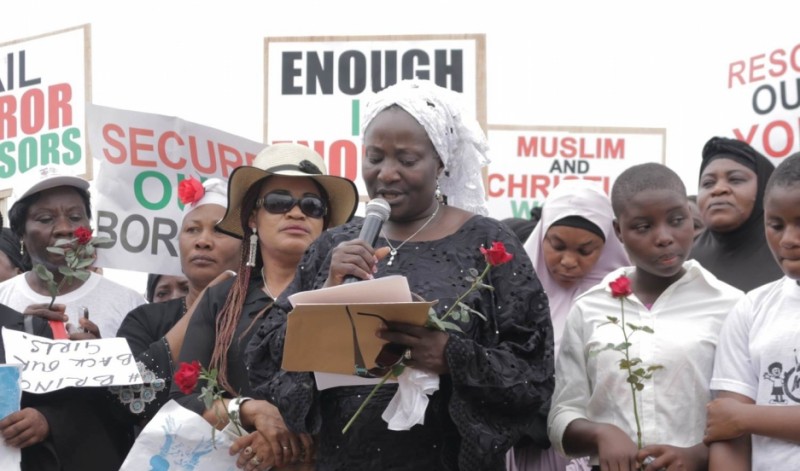polly7
polly7's JournalHow Muslim and Christian Women in Nigeria Banded Together to Fight Violent Extremism
Posted 19 January 2015 6:30 GMT

Nigerian pastor Esther Ibanga joined with Muslim leaders in the city of Jos to call for the return of Chibok girls who were kidnapped by the extremist group Boko Haram. Credit: Women Without Walls Initiative (Willie Abok). Published with PRI's permission
“That's when I realized the issue is really not religion, the issue was politics. But religion was used as a very powerful tool,” she says. “I reached out to her and I said, ‘Hey listen, you know we're not each other's problems. It's not about you being a Muslim and me being a Christian. These politicians are knocking our heads together. And it's all about them maintaining power.'”
After months of collaboration, Ibanga and Hawaja founded the Women Without Walls Initiative.
“We want to do away with the walls that divide and separate us, whether it's the walls of social class or the wall of ethnicity or the walls of religion,” she says. “We really cannot join the politicians in this fight. We are mothers. We are life givers and we are solution bearers. And we think that we should bring solutions to the table, rather than dwell on the problem.”
http://globalvoicesonline.org/2015/01/19/how-muslim-and-christian-women-in-nigeria-banded-together-to-fight-violent-extremism/
How Muslim and Christian Women in Nigeria Banded Together to Fight Violent Extremism
Posted 19 January 2015 6:30 GMT

Nigerian pastor Esther Ibanga joined with Muslim leaders in the city of Jos to call for the return of Chibok girls who were kidnapped by the extremist group Boko Haram. Credit: Women Without Walls Initiative (Willie Abok). Published with PRI's permission
“That's when I realized the issue is really not religion, the issue was politics. But religion was used as a very powerful tool,” she says. “I reached out to her and I said, ‘Hey listen, you know we're not each other's problems. It's not about you being a Muslim and me being a Christian. These politicians are knocking our heads together. And it's all about them maintaining power.'”
After months of collaboration, Ibanga and Hawaja founded the Women Without Walls Initiative.
“We want to do away with the walls that divide and separate us, whether it's the walls of social class or the wall of ethnicity or the walls of religion,” she says. “We really cannot join the politicians in this fight. We are mothers. We are life givers and we are solution bearers. And we think that we should bring solutions to the table, rather than dwell on the problem.”
http://globalvoicesonline.org/2015/01/19/how-muslim-and-christian-women-in-nigeria-banded-together-to-fight-violent-extremism/
What Drives Blasphemy Charges in the Middle East? (It's Not Just Religion)
Global Voices
Posted 8 January 2015 18:20 GMT
Excerpts:
The strange thing about laws against apostasy and blasphemy is that most of the people who fall foul of them are neither apostates nor intentional blasphemers. In practice these laws have very little to do with theology and are mostly used as a pretext for settling political scores or pursuing personal grudges.
Whitaker indeed points to a broader trend across the Arab world. Saudi Arabia and Tunisia, which differ widely both politically and culturally, have seen similar cases in recent years.
“Arab rulers act as if Islam is in danger…maybe they are afraid of the collapse of their thrones,” Tunisian blogger Khaoula Frehcichi wrote in a blog post. “They know very well that criticising the religious institution is the first step to unsettle their regimes.”
http://globalvoicesonline.org/2015/01/08/what-drives-blasphemy-charges-in-the-middle-east-its-not-just-religion/
I like this follow-up comment:
"The word blasphemy should disappear from human consciousness right along with the religious fanatics who created it.
One man's blasphemy is another's truth and truth will never come from religion."
Trade Secrets - Monbiot
By George Monbiot
Source: The Guardian
January 15, 2015
I’m talking about the proposed Transatlantic Trade and Investment Partnership (TTIP) and its provisions for “investor-state dispute settlement”. If this sounds incomprehensible, that’s mission accomplished: public understanding is lethal to this attempted corporate coup.
The TTIP is widely described as a trade agreement. But while in the past trade agreements sought to address protectionism, now they seek to address protection. In other words, once they promoted free trade by removing trade taxes (tariffs); now they promote the interests of transnational capital by downgrading the defence of human health, the natural world, labour rights, and the poor and vulnerable from predatory corporate practices.
Full article: https://zcomm.org/znetarticle/trade-secrets/
Duplicate .... War Begets War: Itís Not about Islam; It Never Was
Sorry Tace.
Please see previous thread here: http://www.democraticunderground.com/1016111405
By Ramzy Baroud
January 14, 2015
First, let’s be clear on some points. Islam has set in motion a system to abolish slavery over 1,200 years before the slave trade reached its peak in the western world.
Did any of these “intellectuals” pause to think that maybe, just maybe, the violent responses to demeaning Islamic symbols reflect a real political sentiment, say for example, a collective feeling of humiliation, hurt, pain and racism that extend to every corner of the globe?
Full article: https://zcomm.org/znetarticle/war-begets-war-its-not-about-islam-it-never-was/
Child living in remains of home destroyed by Israel dies from freezing weather in Gaza
Gaza
GAZA CITY (Ma‘an) 9 Jan — A Palestinian infant fell ill and died due to severe cold in Khan Younis in the southern Gaza Strip on Friday, as winter storm Huda pummeled the region for a third day. Gaza Ministry of Health spokesman Ashraf al-Qidra said that two-month-old Rafah Ali Abu Assi died of chronic obstructive pulmonary disease as a result of the severely cold weather affecting the region. Ashraf al-Qidra said that the infant was taken to the Gaza European Hospital early Thursday for treatment but was pronounced dead at noon on Friday. The infant’s family lives east of Khan Younis in an area that was heavily damaged during Israel’s offensive on Gaza over summer. Her family reportedly continued living in their damaged home despite the destruction. Due to lack of alternative shelter, many of the nearly 110,000 Palestinians left homeless by Israeli bombardment have done the same, including many living in just tents. Temperatures in Gaza have been hovering only a few degrees above freezing in recent days as a freezing winter storm buffeted the region, flooding some areas in the small coastal enclave. The situation is aggravated by the lack of fuel for electric power, meaning that power is available roughly eight hours a day, with occasional cuts on top of that.
http://www.maannews.net/eng/ViewDetails.aspx?ID=752684
Video: Gaza’s ruined homes offer little shelter from storm
AFP 8 Jan — Living by candlelight with no electricity and reliant on sandbags to stop their ruined homes flooding, Gazans who survived last year’s war are now struggling with a brutal winter storm. Duration: 01:07
https://uk.news.yahoo.com/video/gazas-ruined-homes-offer-little-180429998.html
Site list please.
Could you please provide a list of acceptable sites here from which to post from? I don't understand locking a story of a family missing its slain son/brother, but knowing which are not acceptable would be a great help.
Thanks,
polly
Here Lies My Brother
"These are Mohammad’s shoes. I wanted to put them here...
His pants. They still have dirt on them.
I don’t want to wash them; I want to leave them as they are."
-Mohammad Abu Daher’s mother
On May 15, 2014, Mohammad Abu Daher, 16, was fatally shot in the back by an Israeli soldier in the occupied West Bank city of Beitunia. One hour earlier, Israeli forces shot and killed Nadeem Nawara, 17, in the same spot.
Posted January 11, 2014
Mohammad’s family and friends were struck hard by his loss. “Here Lies My Brother,” a short film produced by DCI-Palestine, attempts to provide a glimpse beyond the headlines to see the impact prolonged military occupation has on Palestinian families.
DCI-Palestine has already taken critical steps to pursue justice for Nadeem and Mohammad—by releasing security camera footage that captured the moment when both youths were fatally shot, and a Forensic Architecture video analysis (http://beitunia.forensic-architecture...) pinpointing Nadeem’s killer. Both families deserve to see their sons’ killers held accountable for their crimes.
http://www.informationclearinghouse.info/article40674.htm
What is Going On in Spain?
By Vicente Navarro
Source: Counterpunch
January 10, 2015
Barcelona, 28th December 2014.
Full article: https://zcomm.org/znetarticle/what-is-going-on-in-spain/
Wait ....... what??
I thought Greece was the perfect model!? So much so that Ukraine is hoped to follow it.
Anyway, ....... Yay austerity!!!
How hero hiding in cardboard box guided police by texts as they moved in to take out jihadi brothers
Saturday, Jan 10th 2015
http://www.dailymail.co.uk/news/article-2903870/The-hostage-terrorists-didn-t-know-Print-worker-hid-box-texted-police-Charlie-Hebdo-gunmen-held-boss-captive-final-showdown.html
Holed up in a printworks and surrounded by police, killers Said and Cherif Kouachi were unaware that commandos were being tipped off about their every move.
For, hidden in a cardboard box just yards away was 27-year-old Lilian Lepere.
And he was able to alert police about the location of the gunmen and the layout of the building.
For more than six hours the graphic designer passed on crucial information until the siege ended in a bloody shootout as the terrorist brothers, who had vowed to die as martyrs, burst out from their lair all guns blazing and were mown down in a hail of bullets.

Lilian Lepere, 27, hid in a cardboard box as the Charlie Hebdo gunmen held a father-of-two hostage for eight hours
Profile Information
Gender: Do not displayHometown: Saskatchewan
Home country: Canada
Member since: Sat Jul 9, 2005, 11:46 PM
Number of posts: 20,582